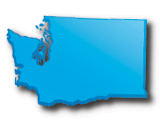Washington Rebates and Incentives Summary
 Washington state has given the country so much—including grunge music and Jimi Hendrix. The state also is internationally recognized as a hotspot for the arts, housing such famous institutions as the Pilchuck Glass School—founded in part by internationally renowned glass sculptor, Dave Chihuly. The state also has a diverse geography—from its temperate rainforest bordering the Pacific Ocean, to cloud-scraping Mt. Rainier, too vintner-perfect, semi-arid lands.
Washington state has given the country so much—including grunge music and Jimi Hendrix. The state also is internationally recognized as a hotspot for the arts, housing such famous institutions as the Pilchuck Glass School—founded in part by internationally renowned glass sculptor, Dave Chihuly. The state also has a diverse geography—from its temperate rainforest bordering the Pacific Ocean, to cloud-scraping Mt. Rainier, too vintner-perfect, semi-arid lands.
The state has long been an advocate of sustainability and energy efficiency. To help its residents and businesses take advantage of the state’s solar and other renewable energy resources—which include wind and geothermal—the state offers residents and businesses numerous incentives, including tax breaks, net metering and performance-based incentives. And the state’s utilities offer additional rebates and low-interest loans for renewable energy projects.
According to the DOE’s Energy Information Administration, “Washington has few fossil fuel resources but has tremendous renewable power potential.” Utilities in the state already produce the majority of power used in the state through hydroelectric dams. For instance, of the nearly 9 gigawatt hours of electricity produced in Washington in May 2010, nearly 7 GWh were produced by the state’s hydroelectric generators.
Despite being a northern state, roughly half of Washington gets an average of 5 kilowatt hours (kWh) of sunlight per square meter. This is mainly in the south and central region of the state, but sunlight extends up to its northern border—making the region ideal for solar power. The rest of Washington, which includes its main population center, Seattle, gets an average of 4 kWh of sunlight per square meter, which is still good for solar installations and is akin to other northern states like Maine and New York.
The state has focused much of its sustainability efforts on energy efficiency and green building practices. That’s likely because 60 percent of the state’s population resides in Seattle, which is not known for its sunny days. The state’s renewable portfolio standard, which requires 15 percent renewable energy by 2020, isn’t nearly as ambitious as California’s goal of 33 percent renewables by 2020, but the state is still ahead of many states.
Washington was the second state—following Colorado—to pass its renewable energy standard through a ballot initiative. Under the law established by the 2006 ballot measure, utilities serving more than 25,000 customers in the state must obtain at least 15 percent of their electricity from new renewable resources by 2020.
, full_html
